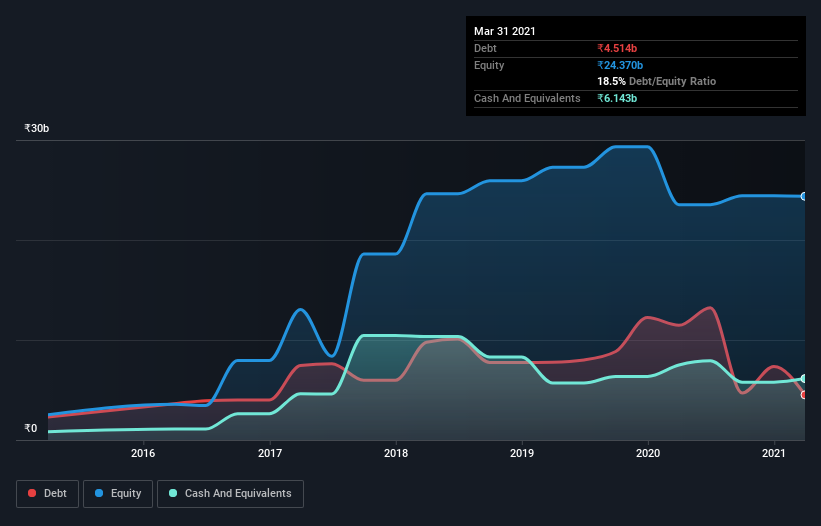
The external fund manager backed by Berkshire Hathaway's Charlie Munger, Li Lu, makes no bones about it when he says 'The biggest investment risk is not the volatility of prices, but whether you will suffer a permanent loss of capital.' So it might be obvious that you need to consider debt, when you think about how risky any given stock is, because too much debt can sink a company. We can see that Quess Corp Limited (NSE:QUESS) does use debt in its business. But should shareholders be worried about its use of debt?
When Is Debt A Problem?
Debt is a tool to help businesses grow, but if a business is incapable of paying off its lenders, then it exists at their mercy. Ultimately, if the company can't fulfill its legal obligations to repay debt, shareholders could walk away with nothing. While that is not too common, we often do see indebted companies permanently diluting shareholders because lenders force them to raise capital at a distressed price. Having said that, the most common situation is where a company manages its debt reasonably well - and to its own advantage. The first thing to do when considering how much debt a business uses is to look at its cash and debt together.
See our latest analysis for Quess
How Much Debt Does Quess Carry?
As you can see below, Quess had ₹4.51b of debt at March 2021, down from ₹11.5b a year prior. However, its balance sheet shows it holds ₹6.14b in cash, so it actually has ₹1.63b net cash.

How Strong Is Quess' Balance Sheet?
The latest balance sheet data shows that Quess had liabilities of ₹16.4b due within a year, and liabilities of ₹6.40b falling due after that. On the other hand, it had cash of ₹6.14b and ₹18.3b worth of receivables due within a year. So it can boast ₹1.59b more liquid assets than total liabilities.
Having regard to Quess' size, it seems that its liquid assets are well balanced with its total liabilities. So while it's hard to imagine that the ₹119.4b company is struggling for cash, we still think it's worth monitoring its balance sheet. Succinctly put, Quess boasts net cash, so it's fair to say it does not have a heavy debt load!
Importantly, Quess's EBIT fell a jaw-dropping 47% in the last twelve months. If that decline continues then paying off debt will be harder than selling foie gras at a vegan convention. The balance sheet is clearly the area to focus on when you are analysing debt. But ultimately the future profitability of the business will decide if Quess can strengthen its balance sheet over time. So if you want to see what the professionals think, you might find this free report on analyst profit forecasts to be interesting.
Finally, a company can only pay off debt with cold hard cash, not accounting profits. Quess may have net cash on the balance sheet, but it is still interesting to look at how well the business converts its earnings before interest and tax (EBIT) to free cash flow, because that will influence both its need for, and its capacity to manage debt. Happily for any shareholders, Quess actually produced more free cash flow than EBIT over the last three years. That sort of strong cash conversion gets us as excited as the crowd when the beat drops at a Daft Punk concert.
Summing up
While we empathize with investors who find debt concerning, you should keep in mind that Quess has net cash of ₹1.63b, as well as more liquid assets than liabilities. The cherry on top was that in converted 108% of that EBIT to free cash flow, bringing in ₹6.5b. So we are not troubled with Quess's debt use. When analysing debt levels, the balance sheet is the obvious place to start. But ultimately, every company can contain risks that exist outside of the balance sheet. Be aware that Quess is showing 4 warning signs in our investment analysis , you should know about...
When all is said and done, sometimes its easier to focus on companies that don't even need debt. Readers can access a list of growth stocks with zero net debt 100% free, right now.
If you decide to trade Quess, use the lowest-cost* platform that is rated #1 Overall by Barron’s, Interactive Brokers. Trade stocks, options, futures, forex, bonds and funds on 135 markets, all from a single integrated account. Promoted
Valuation is complex, but we're here to simplify it.
Discover if Quess might be undervalued or overvalued with our detailed analysis, featuring fair value estimates, potential risks, dividends, insider trades, and its financial condition.
Access Free AnalysisThis article by Simply Wall St is general in nature. It does not constitute a recommendation to buy or sell any stock, and does not take account of your objectives, or your financial situation. We aim to bring you long-term focused analysis driven by fundamental data. Note that our analysis may not factor in the latest price-sensitive company announcements or qualitative material. Simply Wall St has no position in any stocks mentioned.
*Interactive Brokers Rated Lowest Cost Broker by StockBrokers.com Annual Online Review 2020
Have feedback on this article? Concerned about the content? Get in touch with us directly. Alternatively, email editorial-team (at) simplywallst.com.
About NSEI:QUESS
Quess
Operates as a business services provider in India, South East Asia, the Middle East, and North America.
Very undervalued with flawless balance sheet and pays a dividend.


